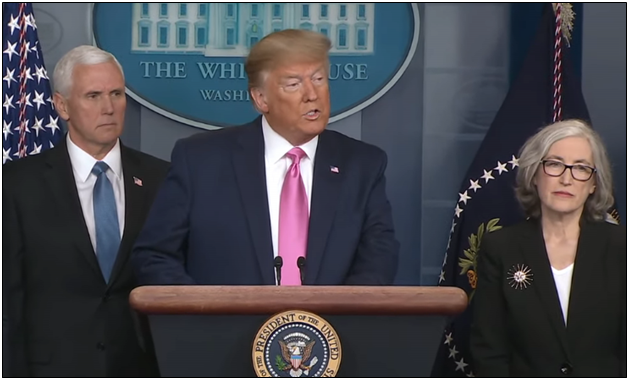“[I]f others aren’t taking care or we think they’re doing it incorrectly… At a right time, we may do that.”
That was President Donald Trump, responding to a question on Feb. 26 at the White House from a reporter asking if the U.S. would institute additional screening and travel restrictions on South Korea and northern Italy, which have been hit with the Chinese coronavirus.
On Jan. 31, after the World Health Organization declared a global health emergency from the coronavirus, President Trump instituted screening and travel restrictions from China to slow the spread of the virus.
The Wuhan coronavirus may have a higher than 2 percent mortality rate, although the World Health Organization has a 1.5 percent mortality rate outside of China and a 3.4 percent rate inside of China.
With such a high mortality rate, containment is critical. Not to be alarmist, but if the entire world’s population of 7.7 billion got sick, more than 150 million could die globally. That’s more than 3 million dead here. It’s deadly serious, and not political.
So far, more than 2,700 have died in China with more than 78,000 cases. South Korea has more than 1,700 cases with 13 deaths, and Italy has more than 600 cases with 17 dead.
In the U.S., so far there have been 60 cases with thankfully no deaths. And to keep it that way, the President may be considering expanding the travel restrictions to other countries with outbreaks like South Korea and Italy — the only comprehensive measure he can take in his powers to prevent the virus from traveling across the border.
Health and Human Services Secretary Alex Azar credited the travel restrictions at his press conference for slowing the virus into the U.S.: “The President’s early and decisive actions, including travel restrictions, have succeeded in buying us incredibly valuable time. This has helped us contain the spread of the virus, handle the cases that we have, and prepare for the possibility that we will need to mitigate broader spread of infections within the United States. The President’s actions taken with the strong support of his scientific advisors have proven to be appropriate, wise, and well-calibrated to the situation.”
That is because, like sheltering in one’s home when you get sick, limiting human-to-human contact via international travel will limit transmission and prevent the virus from spreading further.
Deputy Director of Centers for Disease Control Dr. Anne Schuchat warned to avoid persons who are coughing and sneezing: “The coronavirus that we’re talking about is a respiratory virus. It’s spread in a similar way to the common cold or to influenza. It’s spread through coughs and sneezes.”
South Korea may merit additional consideration for travel restrictions, with the Shincheonji sect that “teaches illness is a sin, encouraging its followers to suffer through diseases to attend services in which they sit closely together, breathing in spittle as they repeatedly amen in unison,” according to Foreign Policy’s S. Nathan Park on Feb. 27.
Park added, “Shincheonji convinces its members to cover their tracks, providing a prearranged set of answers to give when anyone asks if they belong to the cult. Often, even family members are in the dark about whether someone is a Shincheonji follower. The net effect is that Shincheonji followers infect each other easily, then go onto infect the community at large.”
Which is already happening. Per Park, “Although Patient No. 31 ran a high fever, she attended two Shincheonji services which held more than a thousand worshippers each, in addition to attending a wedding and a conference for a pyramid scheme. She visited a clinic after being involved in a minor traffic accident, but ignored the repeated recommendations by the doctors to receive testing for COVID-19. In other cases, a self-identified Shincheonji follower who came to a hospital complaining of high fever ran off during examination when the doctors informed her she may be quarantined.”
That doesn’t sound like South Korea fully has the situation under control, Park notes: “Since the discovery of Patient No. 31, the number of COVID-19 cases in South Korea jumped from 30 to 977 in eight days. Nearly all of the new cases are Shincheonji followers, or traceable to them.”
The thing to watch in the coming days and weeks of course will be how many new confirmed cases there are in the afflicted countries. That will tell the tale if the virus is being contained, or if it’s still spreading and getting worse. Fortunately, President Trump doesn’t sound like he wants to take any chances, meaning if the virus keeps spreading in South Korea, Italy and elsewhere, watch for more travel restrictions until the outbreak is fully under control.
Robert Romano is the Vice President of Public Policy at Americans for Limited Government.







